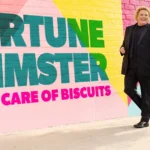How a hip-hop masterpiece helped a community face a growing threat.
Two decades ago marked the first time in 16 years that the number of AIDS cases in the United States had dropped. Yet with that disclosure from the Centers for Disease Control came the sad news that HIV cases among drug-using heterosexuals, women and minorities were on the rise.
Amid this climate surfaced an album called America Is Dying Slowly intended to heighten awareness of the epidemic specifically among African American men. It was released in 1996 by the nonprofit Red Hot Organization, whose mission is to fight HIV/AIDS through pop culture. The album, which celebrates its twentieth anniversary this year, was hailed by critics as a masterpiece.
“The real success of that record was that the title song — an acronym for AIDS — became a public service announcement on urban and hip-hop radio,” says John Carlin, Executive Producer of the album and Co-Founder of Red Hot. He tells Metrosource: “It was really hard to get people in the hip-hop community to talk about AIDS primarily because there was so much of a stigma around homosexuality in that era. It was perceived as a gay disease, and there were feelings among people of color that AIDS was a disease created by the government to kill black people.”
The album showcased some 30 major artists — many of whom remain recognized as leaders in the genre, including Wu-Tang Clan, Coolio and Common (who this year starred in the Fox adaptation of The Wiz, pictured). The online music site HipHopDX recently called the collection “one of the most socially conscious recordings in hip-hop’s history.”
The album’s release followed the 1995 death of Eazy-E, whose diagnosis with AIDS and subsequent death were chronicled in the critically acclaimed 2015 film Straight Outta Compton. At the time, Carlin says, Eazy-E’s death changed the perception of HIV/AIDS from “something in the closet to something that this community needed to deal with.” The unprecedented collaboration of such boldface industry stars fueled Red Hot’s campaign to raise awareness and funds to support organizations such as ACT UP and T.A.G., the Treatment Action Group.
Carlin believe the album’s message still resonates and that its impact cannot be understated. “The legacy is: we stood up and did something at a time when nobody else was and the AIDS epidemic was devastating communities of color,” he says.
Also check out: Black Pastors Take to the Pulpit to Address Rising HIV Challenges in Their Communities
Last modified: October 15, 2018












